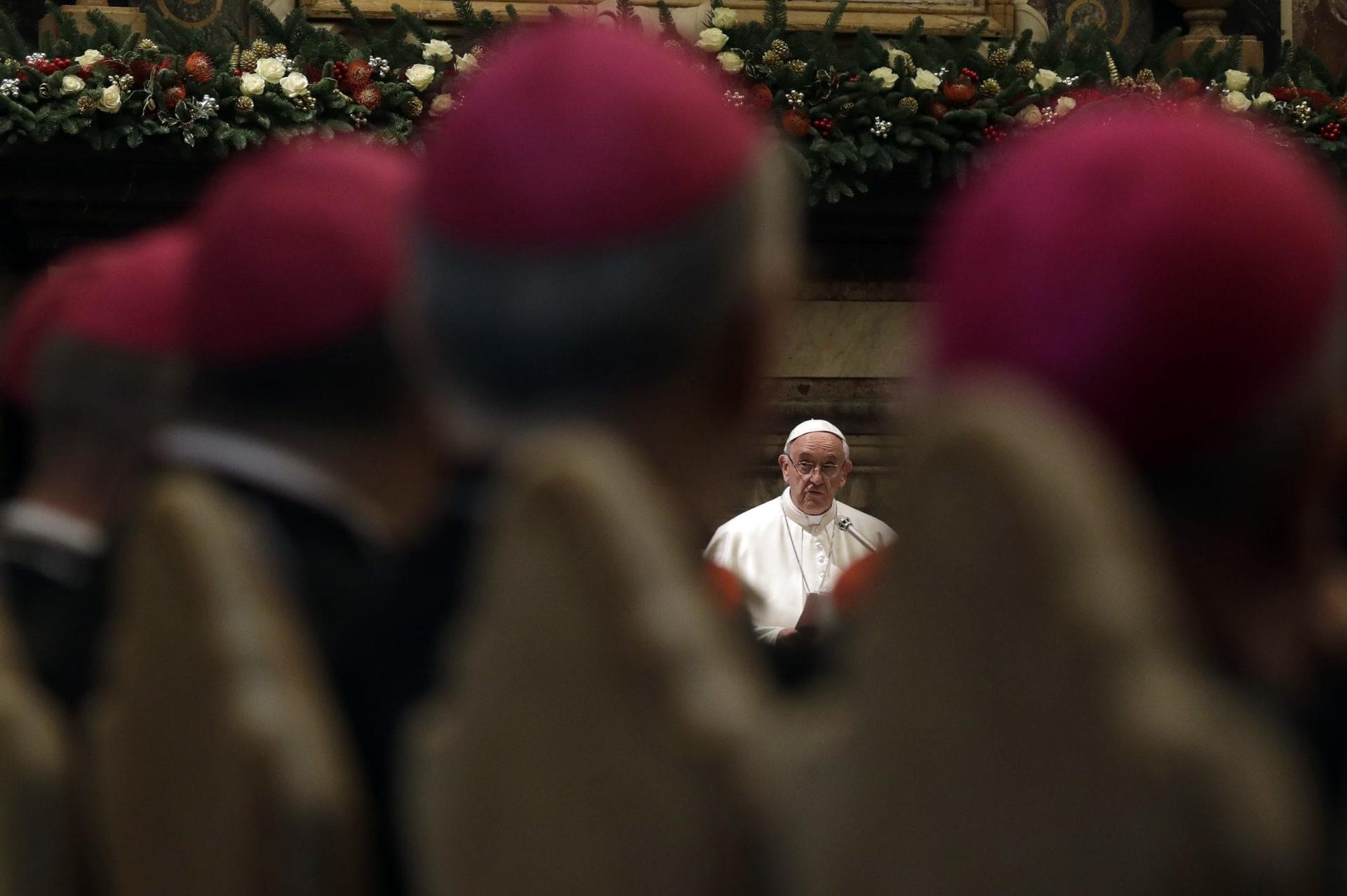ROME – Faced with opposition, leaders generally have two broad choices. Either they can try to find common ground with their foes, “reaching across the aisle,” or they can forge ahead, determined not to be slowed down.
You can try a little of both, but in general the one tends to undercut the other, so mixing them is usually an exercise in futility. Which one a given leader chooses normally is a combination of personality, circumstances, and the political lay of the land.
This holiday season, we saw in Pope Francis a leader who seems to have selected door number two – a basic “damn the torpedoes!” stance.
In Rome, the holidays are prime time for a pope. He’s on stage a great deal, and because it tends to be an otherwise slow news period, his messages attract even greater interest.
Highlights include:
- Speech to the Roman Curia in late December
- Christmas Eve Mass
- Christmas Day Urbi et Orbi blessing
- Angelus address for the feast of St. Stephen
- New Year’s Eve vespers service
- New Year’s Day Mass for feast of Mary the Mother of God
- New Year’s Day Angelus address
- Mass for the feast of the Epiphany
- Early January address to the diplomatic corps accredited to the Holy See
Those are nine major moments when the eyes of the world, especially the ecclesiastical part of it, are on the pope. Moreover, they come at a time when people are usually in a festive mood, more inclined to let bygones be bygones, so they create a natural chance for any pontiff to do some fence-mending if he perceives the need.
One might have thought Francis would be thinking along those lines this year, given the tumult unleashed in 2016 over his document Amoris Laetitia, and the perception in Catholicism of a deepening divide between those encouraged by the pope’s reform-minded, pastoral approach, and those alarmed about what they see as a lack of clarity and resolve in the defense of tradition.
Francis is certainly capable of trying to overcome such divides. In a speech at the close of the 2014 Synod of Bishops, he urged the Church to shun both a “hostile rigidity” and a “false mercy,” in language that drew thunderous applause and was widely seen as an effort to assure both sides in the synod’s debates that the pope understood them.
However, reaching across the aisle wasn’t quite the spirit Pope Francis exuded this holiday season. Instead, he appeared to project resolve to keep going.
Things began with his curia speech on Dec. 22. Francis acknowledged his reform efforts have run into opposition, distinguishing between “open resistance,” which he said is constructive, and “hidden” and “malicious” resistance, which he said “sprouts in distorted minds and shows itself when the devil inspires bad intentions, often wrapped in sheep’s clothing.”
Accusing some of your critics of doing the devil’s work, needless to say, is not exactly the tone of a leader for whom job number one is healing.
(Granted, Francis did say that even malicious criticism “merits being heard, listened to and encouraged to express itself,” but it’s unlikely that people in the Church who may have felt targeted by the pope – including, perhaps, a few sitting in the room that morning – got far beyond being linked with the devil.)
On New Year’s Eve, as he often has in the past, Francis warned Christians against being “narrow-minded,” succumbing to “sterile nostalgia,” and being “prisoners of an all-or-nothing attitude.”
In itself, such language doesn’t represent a dig at anyone, and it fit into the spiritual call to conversion the pontiff wanted to deliver.
Yet since those phrases have become code words in the Amoris debate, often used by the document’s supporters to describe the positions of its critics, Francis’s homily probably wouldn’t have been taken as conciliatory by the opposition – especially Catholics who’ve themselves been called “narrow-minded” or “nostalgic” in the heat of an Amoris debate.
Even stronger was the pontiff’s vocabulary for the feast of the Epiphany on Jan 6, when he derided the “prophets of doom” who don’t want anything to change, insisting on nothing more than “the usual fare.”
Again, “prophets of doom” is something of a loaded phrase in Catholic argot. It’s associated with a celebrated speech St. Pope John XXIII gave at the opening of the Second Vatican Council in 1962, and was taken as a reference to conservatives in the Roman Curia who were less than thrilled about the idea of calling a council in the first place.
Since then, it’s become shorthand for tradition-minded opposition to progressive change in Catholicism, and would have been heard by insiders as a rebuke.
Also striking was the absence anywhere along the way of a papal version of the rhetoric we typically hear from other kinds of leaders seeking common ground – “there are good people on both sides of the aisle,” “we’re all Americans who love our country,” “I too have made mistakes,” etc.
Nor were there any of the gestures a desire for bipartisanship usually breed, such as a conciliatory holiday photo-op or phone call with one of the opposition leaders, at least any that have become public knowledge.
Not only was there no such gesture, but a new front opened up over the holidays in the perceived antagonism between the pope and American Cardinal Raymond Burke, one of the authors of a set of dubia directed at the pontiff about Amoris, in a dispute over the Knights of Malta.
Bottom line: The holidays seemed to offer Pope Francis chances to reach out, and he didn’t bite.
So, what’s going on?
One possibility, of course, is that Francis simply is convinced he’s on the right course, and doesn’t intend to allow what he regards as wrong-headed thinking to drive him off it.
Added to that might be a diagnosis that resistance is being exaggerated, amplified by a social media echo chamber. Certainly most polling suggests Francis still enjoys strong grassroots support, and the longer his papacy goes on, the more the balance among bishops around the world is tipping in favor of his own men.
Perhaps, too, Francis has reached the sobering conclusion that in this period of history, efforts at compromise and bipartisanship just don’t work, and to get anything done you have to move forward and not look back. To the extent American politics is any guide, one could understand that view.
There’s also the psychological point that close friends of Pope Francis say he’s got a bit of a stubborn streak, and isn’t temperamentally inclined to rethink decisions. There’s a Jesuit element too, since Jesuit superiors are expected to consult widely before reaching conclusions but be firm about applying them once they have.
It could also be that the pope’s reading is that the other side doesn’t seem terribly interested in compromise anyway, so slowing down to try to build consensus risks throwing good money after bad.
Whatever the case, what the holiday season appeared to indicate is that Francis is moving full steam ahead, so the short-term forecast could be for additional drama.
Whether that’s healthy is in the eye of the beholder, and perhaps can only be judged with time. What one can say for now is that there are few signs, at least so far, that 2017 looms as the year of a great ecclesiastical Kiss of Peace.

















